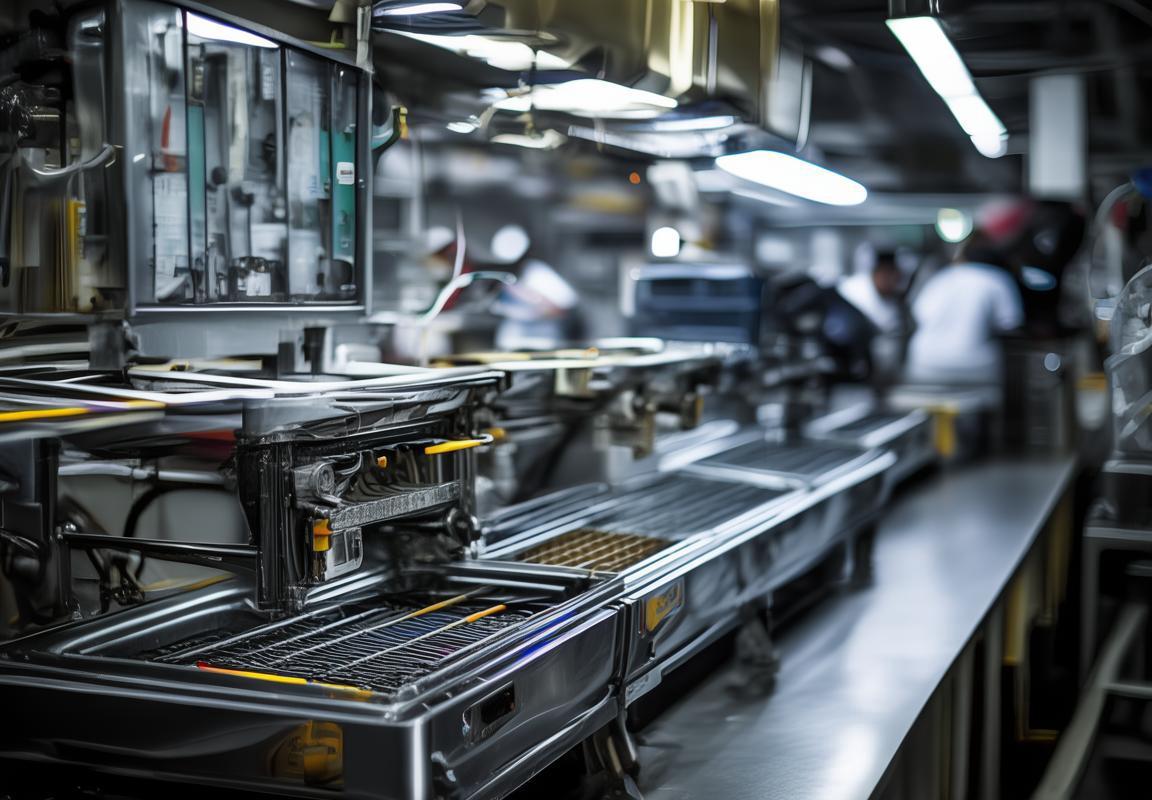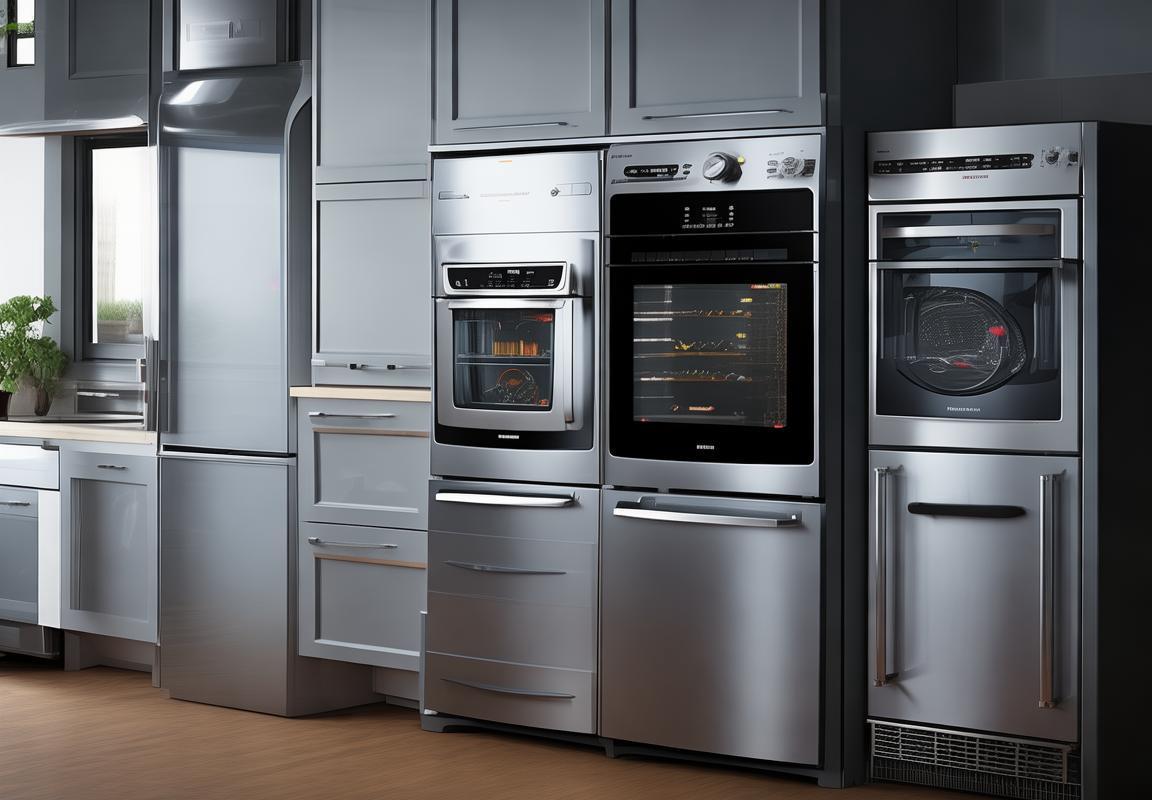In a world where the demand for personalized and innovative kitchen appliances is soaring, the role of OEM (Original Equipment Manufacturer) kitchen appliance manufacturers has become increasingly pivotal. These specialized companies play a critical part in shaping the landscape of kitchen appliance production by tailoring their services to meet the unique needs of various brands. In this article, we delve into the intricacies of working with an OEM kitchen appliance manufacturer, exploring how they can transform your brand’s vision into reality, the key services they offer, and the factors to consider when choosing the right partner. Through real-life case studies and an outlook on the future, we aim to provide a comprehensive understanding of the value and potential of OEM manufacturing in the kitchen appliances sector.
Understanding the Role of an OEM Kitchen Appliances Manufacturer
In the world of kitchen appliances, the term “OEM” stands for Original Equipment Manufacturer. This unique business model has become an essential component in the industry, allowing brands to focus on their core competencies while relying on specialized manufacturers to produce their products. But what exactly does an OEM kitchen appliances manufacturer do, and why is their role so pivotal?
At its core, an OEM manufacturer produces custom-designed kitchen appliances that are branded and sold under a different company’s name. This means that while the final product carries the logo and branding of the customer brand, the mechanical and technical aspects are developed and produced by the OEM. Let’s delve deeper into the various aspects of this role.
Firstly, an OEM kitchen appliances manufacturer excels in research and development. These companies are constantly innovating to stay ahead of market trends and consumer demands. By investing in R&D, they can create cutting-edge appliances that meet the specific needs of their clients. This includes everything from energy-efficient refrigerators to sleek, modern cooktops.
One of the primary responsibilities of an OEM is to understand the client’s vision and brand identity. This requires a deep understanding of the market and the target audience. By collaborating closely with their clients, OEMs can ensure that the appliances they produce not only meet functional requirements but also align with the brand’s aesthetic and messaging.
Customization is another key aspect of an OEM’s role. Each client has unique requirements, whether it’s specific dimensions, features, or certifications. An OEM must be able to adapt their production process to accommodate these requests, often involving intricate engineering and design work. This flexibility is crucial in meeting the diverse needs of different markets and consumer preferences.
Quality control is paramount in the kitchen appliances industry, and OEM manufacturers take this very seriously. They have rigorous quality assurance processes in place to ensure that every appliance they produce meets the highest standards. This includes thorough testing for durability, safety, and performance, ensuring that the client’s customers receive a reliable and high-quality product.
Another significant role of an OEM is to manage the supply chain. They handle the procurement of raw materials, the manufacturing process, and the distribution of finished goods. This includes managing inventory, logistics, and ensuring timely delivery to the client’s manufacturing facilities or directly to end-users.
Collaboration with component suppliers is also essential. OEMs often work with a network of trusted suppliers to source high-quality components for their appliances. This partnership allows them to offer a wide range of products, from budget-friendly to premium, depending on the client’s needs.
Additionally, OEM manufacturers are often responsible for compliance with various regulations and standards. This can include safety certifications, environmental regulations, and energy efficiency requirements. By taking on this responsibility, they allow their clients to focus on marketing and sales efforts, knowing that the technical aspects are in capable hands.
In terms of brand development, an OEM manufacturer can provide valuable insights and recommendations. They have a wealth of industry knowledge and can suggest features and design elements that will resonate with consumers. This collaboration can lead to a stronger, more compelling product offering.
From a strategic perspective, an OEM manufacturer can also help clients stay competitive. By offering a wide range of appliances, they can cater to different market segments and price points. This diversification can be a significant advantage in a crowded and dynamic market.
Lastly, an OEM’s role is not just limited to manufacturing. They often provide ongoing support, including technical assistance, maintenance, and product updates. This support ensures that the client’s brand remains associated with quality and reliability over the long term.
In conclusion, the role of an OEM kitchen appliances manufacturer is multifaceted and essential to the success of many brands. From R&D and design to production, supply chain management, and compliance, these manufacturers play a crucial part in bringing high-quality, innovative kitchen appliances to market. By partnering with an OEM, brands can leverage their expertise to focus on their core strengths while delivering exceptional products to their customers.

What is OEM in the Kitchen Appliances Industry?
OEM, which stands for Original Equipment Manufacturer, is a term that plays a pivotal role in the kitchen appliances industry. It refers to a company that produces goods or components that are then sold to another company for use in their own products. This concept is deeply rooted in the manufacturing world, and its impact on the kitchen appliances sector is multifaceted.
In the context of kitchen appliances, an OEM manufacturer is essentially a contract producer. They take the designs, specifications, and branding from a client, often a brand or retailer, and produce the appliances to those exact specifications. This means that the end consumer may not be aware that the product they are purchasing is an OEM item, as it carries the brand name of the company selling it.
The process begins with the client providing the OEM manufacturer with detailed technical drawings and specifications. These can range from basic guidelines to highly complex blueprints, depending on the level of customization required. The OEM then uses these as a blueprint to create the product, ensuring that every aspect aligns with the client’s brand identity and product standards.
One of the key aspects of the OEM model is the level of control the client has over the manufacturing process. While the OEM takes care of the production, the client maintains a significant say in the design, quality, and branding of the product. This collaboration allows for a high degree of customization, which is crucial in the competitive kitchen appliances market.
In terms of the product lifecycle, OEMs often play a role in the research and development phase. They might suggest improvements or innovations that can be integrated into the client’s product line. This not only helps in keeping the product fresh and competitive but also allows the client to leverage the OEM’s expertise in manufacturing processes and materials.
The OEM kitchen appliances industry is marked by a high degree of specialization. Manufacturers in this sector often focus on particular types of appliances, such as refrigerators, dishwashers, or ovens. This specialization allows them to become experts in their field, optimizing production efficiency and cost-effectiveness.
One of the primary advantages of working with an OEM in the kitchen appliances industry is the cost savings. By outsourcing the manufacturing process, companies can reduce their overhead costs and focus on their core competencies, such as marketing and distribution. This cost-effectiveness is particularly appealing to small and medium-sized enterprises (SMEs) that may not have the resources to invest in their own manufacturing facilities.
Another significant benefit is the flexibility that OEMs offer. Companies can quickly adapt to market trends and consumer demands by working with an OEM. If a new feature becomes popular or a design needs to be updated, the OEM can make these changes without the long lead times that might be associated with setting up a new production line in-house.
Quality control is a non-negotiable aspect of the OEM kitchen appliances industry. Manufacturers must adhere to stringent quality standards to ensure that the products meet the client’s expectations and, ultimately, the consumer’s satisfaction. This often involves rigorous testing and quality assurance protocols at various stages of the production process.
Innovation is also a driving force in the OEM sector. As technology advances, OEMs are constantly seeking ways to incorporate new features and materials into kitchen appliances. This not only benefits the client by keeping their products at the forefront of innovation but also helps to drive the industry forward as a whole.
From a branding perspective, OEMs can be instrumental in maintaining consistency across a product line. They understand the importance of brand image and work to ensure that every appliance produced aligns with the client’s marketing strategy and visual identity.
The environmental impact of manufacturing is another area where OEMs can make a difference. Many OEM manufacturers are now focusing on sustainability, using eco-friendly materials and energy-efficient designs. This not only appeals to environmentally conscious consumers but also helps clients to position their brand as eco-friendly and socially responsible.
In conclusion, the OEM model in the kitchen appliances industry is a strategic partnership that offers numerous benefits. It allows for customization, cost savings, flexibility, and access to specialized expertise. As the market continues to evolve, the role of the OEM in driving innovation and quality will likely remain integral to the success of kitchen appliance brands.

The Benefits of Partnering with an OEM Manufacturer
Partnering with an OEM (Original Equipment Manufacturer) in the kitchen appliances industry can offer a multitude of benefits that can significantly enhance a brand’s capabilities and market presence. Here’s a closer look at some of these advantages:
-
Cost-Effective Production: One of the primary benefits of working with an OEM manufacturer is the cost savings. These companies specialize in producing goods in large volumes, which allows them to leverage economies of scale. This means that you can get high-quality kitchen appliances at a lower cost per unit compared to setting up your own manufacturing facility.
-
Expertise and Experience: OEM manufacturers bring a wealth of knowledge and experience to the table. They have a deep understanding of the latest technologies, industry standards, and market trends. This expertise ensures that the products they produce are not only of high quality but also meet the evolving demands of consumers.
-
Customization and Innovation: When you work with an OEM, you have the opportunity to customize products to meet your specific needs. This can range from minor design modifications to entire product reconfigurations. OEMs are often at the forefront of innovation, and their R&D teams can help you develop new products that stand out in the market.
-
Rapid Production and Shorter Lead Times: OEM manufacturers are equipped to handle large orders with efficiency. They have streamlined production processes and can often turn around products much faster than a brand would if it were to produce them in-house. This rapid production can be crucial for meeting tight market deadlines or launching new products quickly.
-
Focus on Core Competencies: By outsourcing the manufacturing process to an OEM, your brand can concentrate on its core competencies, such as marketing, sales, and customer service. This strategic focus can lead to improved performance in areas where your brand has a competitive edge.
-
Quality Control and Compliance: OEM manufacturers are typically stringent about quality control. They adhere to international standards and regulations, ensuring that the products they deliver are reliable and safe. This can save your brand from potential liability issues and customer dissatisfaction.
-
Global Reach: Many OEM manufacturers have a global presence, which means they can source materials and components from around the world. This not only provides access to a wider variety of resources but also allows for competitive pricing and a more sustainable supply chain.
-
Flexibility and Scalability: The flexibility to scale production up or down based on market demand is a significant advantage of working with an OEM. This agility can help your brand navigate fluctuating market conditions without the constraints of fixed manufacturing capacity.
-
Reduced Capital Expenditure: Investing in a manufacturing facility is a significant capital expenditure. By partnering with an OEM, you can avoid these upfront costs and instead allocate your resources to other areas of your business that may need improvement or expansion.
-
Sustainability and Environmental Responsibility: Many OEM manufacturers are committed to sustainability and environmental responsibility. They use eco-friendly materials, implement energy-efficient processes, and minimize waste. By associating with such a manufacturer, your brand can enhance its green credentials and appeal to environmentally conscious consumers.
-
Diverse Product Range: OEMs often have the capability to produce a wide range of kitchen appliances, from small appliances like toasters and blenders to large appliances such as refrigerators and dishwashers. This diversity allows your brand to offer a comprehensive product line without the need to develop each product in-house.
-
Enhanced Brand Image: By ensuring that your kitchen appliances are manufactured to the highest standards, you can enhance your brand’s image. Customers are more likely to trust and prefer brands that offer quality products, and an association with a reputable OEM can reinforce this perception.
-
Market Testing and Feedback: OEMs can assist in market testing and provide valuable feedback on product performance and consumer preferences. This can be invaluable for refining your product offerings and making informed decisions about future product lines.
-
Strategic Partnerships: Working with an OEM can lead to strategic partnerships that extend beyond just manufacturing. These relationships can open doors to collaborative projects, joint marketing initiatives, and even the development of new business models.
-
Peace of Mind: Knowing that your kitchen appliances are being produced by a professional, reliable OEM can give you peace of mind. This allows you to focus on other aspects of your business, confident that the manufacturing process is in capable hands.
In summary, partnering with an OEM manufacturer in the kitchen appliances industry can offer a multitude of benefits, from cost savings and customization to expertise and market reach. It’s a strategic move that can help brands thrive in a competitive landscape.

Key Services Offered by an OEM Kitchen Appliances Manufacturer
In the competitive world of kitchen appliances, partnering with an OEM (Original Equipment Manufacturer) can offer a multitude of advantages. An OEM kitchen appliances manufacturer specializes in producing products that are branded and sold under another company’s name. Here are some of the key services they provide:
-
Customized Design and EngineeringOEM manufacturers excel in tailoring kitchen appliances to meet specific design requirements. They offer comprehensive design and engineering services, from conceptualizing the product to ensuring it meets the brand’s aesthetic and functional standards. This includes everything from choosing materials to optimizing performance.
-
Quality Control and AssuranceOne of the primary services an OEM manufacturer provides is rigorous quality control. They implement strict quality assurance protocols to ensure that every appliance that leaves their facility meets the highest standards. This includes testing for durability, safety, and efficiency, ensuring that the final product is reliable and up to par with industry regulations.
-
Efficient Production and ScaleOEM manufacturers are equipped to handle large-scale production efficiently. They have the infrastructure, resources, and expertise to produce appliances in high volumes without compromising on quality. This scalability is particularly beneficial for brands looking to enter new markets or increase their product offerings.
-
Cost-Effective SolutionsBy leveraging the economies of scale and expertise of an OEM manufacturer, brands can significantly reduce production costs. OEMs often have established supply chains and can negotiate better deals on materials and components. This cost-effectiveness allows brands to offer competitive pricing to their customers.
-
Rapid Prototyping and Short Lead TimesOEMs are adept at rapid prototyping, which is crucial for brands that need to bring new products to market quickly. They can create prototypes that closely resemble the final product, allowing for early testing and feedback. This service ensures that brands can launch their products on time, maintaining a competitive edge.
-
Compliance with International StandardsNavigating the complexities of international regulations and standards can be daunting. OEM manufacturers are well-versed in these requirements, ensuring that all appliances they produce are compliant with local and international safety, environmental, and labeling standards. This service takes the burden off the brand and ensures smooth market entry.
-
Product Development and InnovationOEMs are not just about mass production; they also contribute to product development and innovation. They stay updated with the latest technological advancements and industry trends, often suggesting improvements or introducing new features that can enhance the brand’s product line.
-
After-Sales Support and ServiceAn OEM manufacturer often provides after-sales support services, including technical assistance, warranty management, and customer service. This support extends beyond the initial sale, ensuring that the brand maintains a positive relationship with its customers even after the product has been purchased.
-
Flexibility in Product RangeOEM manufacturers can adapt to the changing needs of the market by offering a wide range of product options. Whether a brand needs to expand its product line, introduce new models, or modify existing ones, an OEM can accommodate these changes efficiently.
-
Strategic Partnerships and Market InsightsBy working with an OEM, brands can benefit from strategic partnerships that provide insights into market trends and consumer preferences. OEMs often have a pulse on the industry and can offer valuable advice on product positioning and marketing strategies.
-
Sustainability and Environmental ResponsibilityIn today’s market, sustainability is a key concern. OEM manufacturers can assist brands in creating eco-friendly appliances by using sustainable materials and designing for energy efficiency. They can also help in developing packaging and logistics that minimize environmental impact.
-
Global Supply Chain ManagementAn OEM manufacturer can manage the entire supply chain, from sourcing raw materials to delivering finished products. This includes logistics, inventory management, and distribution, ensuring that the brand’s products are available where and when they are needed.
By offering these comprehensive services, OEM kitchen appliances manufacturers play a crucial role in helping brands succeed in a highly competitive and ever-evolving industry.

How OEMs Customize Kitchen Appliances for Your Brand
In the competitive world of kitchen appliances, OEMs play a pivotal role in helping brands stand out. Here’s how these manufacturers tailor their products to align with your brand identity:
Customization of Design and AestheticsManufacturers specializing in OEM services understand that the visual appeal of kitchen appliances is crucial. They offer a range of design customization options, from color schemes and finishes to unique shapes and sizes. This allows brands to create a cohesive look that resonates with their target market, whether it’s sleek and modern, rustic and traditional, or anything in between.
Integration of Brand Logos and Branding ElementsOne of the key advantages of working with an OEM is the ability to integrate your brand’s logo and other branding elements seamlessly into the appliances. This not only reinforces brand recognition but also ensures that your products are instantly identifiable in the marketplace. OEMs can work with your design team to ensure that every detail, from the placement of the logo to the materials used, aligns with your brand’s image.
Tailored Functionality to Meet Specific NeedsOEMs can modify the functionality of kitchen appliances to cater to specific requirements. This might involve adding or removing features, optimizing energy efficiency, or integrating smart technology. By customizing the functionality, brands can offer products that not only look great but also perform exceptionally well, addressing the unique needs of their customers.
Quality Control and Standards AdherenceWhen you partner with an OEM, you gain access to their rigorous quality control processes. They can ensure that your appliances meet the highest industry standards, from material selection to manufacturing techniques. This not only guarantees a high-quality product but also gives your brand a reputation for reliability and excellence.
Custom Packaging and BrandingThe presentation of your product is just as important as the appliance itself. OEMs can provide custom packaging solutions that not only protect the appliance during shipping but also serve as an extension of your brand. This includes designing packaging that reflects your brand’s colors, logo, and messaging, creating a consistent brand experience from the moment the customer sees the product.
Customized Assembly and ConfigurationOEMs can customize the assembly and configuration of kitchen appliances to suit your brand’s requirements. This might involve changing the internal layout to accommodate specific components, or modifying the assembly process to ensure efficient production and reduced lead times. By doing so, OEMs help streamline your supply chain and improve operational efficiency.
Flexibility in Production and SourcingOne of the strengths of working with an OEM is the flexibility they offer in production and sourcing. They can adapt to changes in demand, scale up or down production as needed, and source materials from various suppliers to find the best quality and cost-effectiveness. This flexibility allows your brand to be agile and responsive to market shifts.
Customized Marketing and Sales MaterialsOEMs can also assist in creating custom marketing and sales materials that highlight the unique aspects of your brand and its appliances. This includes product brochures, catalogs, and even digital content that can be used across various marketing channels, ensuring that your brand story is consistently told.
Compliance with International RegulationsFor brands looking to expand into international markets, OEMs can be invaluable. They have the expertise to ensure that your kitchen appliances comply with local regulations and standards, from safety certifications to energy efficiency requirements. This allows your brand to enter new markets with confidence, knowing that your products meet the necessary criteria.
In conclusion, OEM kitchen appliance manufacturers offer a wide array of services that can be customized to fit the specific needs of your brand. From design and functionality to branding and compliance, these manufacturers are instrumental in helping brands create a strong market presence with products that are not only visually appealing but also meet the highest standards of quality and performance.

The Process of Working with an OEM Manufacturer
Navigating the partnership with an OEM manufacturer can be a complex journey, but understanding the process is key to a successful collaboration. Here’s a detailed look at what goes on behind the scenes:
Understanding the BriefBefore anything else, the OEM manufacturer will seek to fully understand your brand’s vision and the specific needs of your customers. This involves a detailed brief that outlines your product specifications, desired features, target market, and any unique selling points you wish to emphasize.
Design CollaborationOnce the brief is clear, the OEM manufacturer’s design team steps in. They collaborate closely with your team to create a product that not only meets your specifications but also resonates with your brand identity. This phase includes sketching, prototyping, and 3D modeling to visualize the potential designs.
Quality ControlQuality is paramount in the OEM manufacturing process. The manufacturer will implement rigorous quality control measures to ensure that every appliance meets the highest standards. This includes material sourcing, component testing, and assembly checks. Your brand’s reputation is on the line, so the manufacturer will work tirelessly to maintain consistency and excellence.
Customization and BrandingCustomization is where the OEM process truly shines. The manufacturer can tailor the appliances to reflect your brand’s aesthetic and functionality. This can range from subtle changes like color schemes and logo placement to more significant modifications such as unique features or controls. The goal is to make the appliance feel like an extension of your brand.
Sampling and FeedbackAfter the initial design and quality checks, the OEM manufacturer will typically produce a sample or a small batch of the product. This sample is then sent to your team for review. Feedback is crucial at this stage, as it allows for any necessary adjustments before mass production begins. The back-and-forth ensures that the final product aligns perfectly with your expectations.
Mass ProductionOnce the design is finalized and the samples approved, the manufacturer moves into mass production. This phase is highly streamlined, with efficient production lines and quality control checkpoints to ensure that every unit meets the same high standards as the prototypes. The manufacturer may also offer different production volumes, from small batches for testing to large-scale production for market launch.
Packing and LogisticsThe finished appliances need to be packaged and transported efficiently. The OEM manufacturer will work with you to select the right packaging materials and methods that protect the products during transit. They will also coordinate logistics, ensuring that the products are delivered to your warehouse or directly to your customers, depending on your distribution strategy.
After-Sales SupportA good OEM manufacturer understands that the relationship doesn’t end with the delivery of the product. They offer after-sales support, which can include warranty services, technical assistance, and spare parts availability. This support is essential for maintaining customer satisfaction and your brand’s reputation.
Continuous ImprovementThe OEM manufacturer is always looking for ways to improve. They will analyze production data, customer feedback, and market trends to suggest upgrades or new features for future models. This commitment to continuous improvement ensures that your brand stays competitive and relevant.
Documentation and ReportingThroughout the process, the OEM manufacturer will provide detailed documentation and reports. This includes production schedules, quality control results, and any changes made during the manufacturing process. Transparency is key, as it allows you to monitor the progress and ensure compliance with your brand standards.
Building a Long-Term PartnershipFinally, the process of working with an OEM manufacturer is not just about a single product or project. It’s about building a long-term partnership. The manufacturer will work to understand your brand’s goals and challenges, and they will adapt their processes to support your growth. This collaborative approach can lead to a strong, mutually beneficial relationship that spans years.

Choosing the Right OEM Kitchen Appliances Manufacturer
Selecting the right OEM kitchen appliances manufacturer is a critical decision that can significantly impact the success of your brand. Here are some key factors to consider when making this important choice:
The Importance of ReputationThe reputation of an OEM manufacturer speaks volumes about their quality, reliability, and customer service. Look for a company with a strong track record in the industry, as this is often a testament to their ability to deliver high-quality products consistently.
Quality Control and StandardsAn OEM manufacturer’s commitment to quality control and adherence to industry standards is non-negotiable. Ensure that they have rigorous processes in place to guarantee that every appliance meets the highest standards of craftsmanship and safety.
Customization and InnovationYour brand may require a unique approach to kitchen appliances. The right OEM should offer a range of customization options, from design modifications to incorporating specific features that set your products apart from the competition.
Communication and CollaborationA good OEM manufacturer should be a partner, not just a supplier. They should be open to communication and willing to collaborate on product development. This means being responsive to your needs and ready to make adjustments to meet your brand’s vision.
Experience and ExpertiseExperience in the kitchen appliances industry is invaluable. An experienced OEM has likely encountered and resolved many of the challenges that come with manufacturing these complex products. Their expertise can translate into more efficient production and a deeper understanding of market trends.
Flexibility in ProductionYour business may have fluctuating demand, and the right OEM should be able to adjust their production capabilities to meet your needs. This includes the ability to scale up or down production quickly and efficiently.
Supply Chain ManagementA robust supply chain is essential for ensuring timely delivery and managing costs. The OEM should have a well-established network of suppliers that guarantees the availability of high-quality materials and components.
Financial StabilityA financially stable OEM manufacturer is less likely to face production disruptions or quality control issues. Check their financial statements and consider their stability over time before making a commitment.
Certifications and ComplianceEnsure that the OEM adheres to relevant certifications and compliance requirements. This includes environmental standards, safety regulations, and any specific certifications that are important to your brand and its customers.
ScalabilityAs your brand grows, your OEM partner should be able to scale their operations to accommodate increased production. This scalability should not only apply to quantity but also to the variety and complexity of the products you offer.
Customer Support and After-Sales ServiceThe level of customer support and after-sales service provided by an OEM can greatly influence your customers’ satisfaction. A manufacturer that offers comprehensive support can help maintain your brand’s reputation and ensure a smooth customer experience.
Innovation and DevelopmentA manufacturer that invests in research and development is more likely to bring innovative solutions to the table. This can give your brand a competitive edge by offering cutting-edge appliances that meet the evolving needs of consumers.
Technology and AutomationThe use of modern technology and automation in the manufacturing process can lead to higher efficiency and reduced costs. Look for an OEM that employs advanced technology to streamline production and improve product quality.
Long-Term PartnershipsBuilding a long-term relationship with an OEM manufacturer can be beneficial for both parties. Consider their willingness to invest in your brand’s growth and their ability to adapt to changes in the market over time.
Ultimately, choosing the right OEM kitchen appliances manufacturer involves a careful evaluation of their capabilities, culture, and compatibility with your brand’s values and objectives. A thorough vetting process will help ensure that you select a partner who is dedicated to helping your brand thrive in the competitive kitchen appliances market.

Case Studies: Successful Collaborations with OEMs
When it comes to the appliance industry, successful collaborations with Original Equipment Manufacturers (OEMs) can lead to groundbreaking products and market differentiation. Here are a few case studies showcasing the fruitful partnerships between brands and their OEM partners:
-
Brand A’s Refrigerator RevolutionBrand A, a well-known appliance brand, sought to innovate its refrigerator line. They partnered with an OEM to develop a high-efficiency refrigerator that featured smart technology and an eco-friendly design. The OEM’s expertise in cooling systems and materials allowed Brand A to bring a product to market that not only met their specifications but also exceeded consumer expectations. The partnership resulted in a significant increase in sales and a reputation for innovation within the industry.
-
Brand B’s Smart Oven SuccessBrand B wanted to enter the smart kitchen appliance market with a sleek, user-friendly oven. After thorough research, they chose an OEM known for their cutting-edge smart appliance technology. The OEM worked closely with Brand B to tailor the oven’s features, ensuring compatibility with the brand’s existing product range. The resulting smart oven was a hit, offering intuitive controls and a range of cooking modes that appealed to tech-savvy consumers. This collaboration not only boosted Brand B’s market share but also positioned them as a leader in smart kitchen solutions.
-
Brand C’s Compact Laundry SolutionBrand C faced a challenge: how to offer a compact yet powerful washing machine for urban dwellers with limited space. They turned to an OEM that specialized in designing space-saving laundry appliances. The OEM’s innovative approach allowed Brand C to create a machine that was not only small but also energy-efficient and capable of handling a variety of laundry loads. The partnership was a success, as the compact washing machine became a top-selling item and a key differentiator for Brand C in the crowded laundry appliance market.
-
Brand D’s Luxury Kitchen LineFor Brand D, a premium appliance brand, the key to expanding their luxury kitchen line was to work with an OEM that shared their commitment to quality and craftsmanship. The OEM provided custom designs, high-quality materials, and meticulous attention to detail, resulting in a line of kitchen appliances that exuded luxury and functionality. The collaboration paid off, as Brand D’s kitchen line garnered attention from high-end consumers, driving sales and enhancing the brand’s prestige.
-
Brand E’s Energy-Saving DishwasherBrand E wanted to introduce an energy-saving dishwasher to their product line, but they lacked the in-house expertise to develop such a product. They partnered with an OEM that had a proven track record in energy-efficient appliances. The OEM’s engineering team worked alongside Brand E to create a dishwasher that not only conserved energy but also offered a range of features that made it a standout product. This collaboration was a strategic move for Brand E, as it allowed them to enter a growing market segment without compromising on quality or innovation.
-
Brand F’s Eco-Friendly Appliance LineBrand F was dedicated to sustainability and sought to develop an eco-friendly appliance line. They partnered with an OEM that had a strong focus on green manufacturing processes and sustainable materials. The OEM’s collaboration with Brand F resulted in a range of appliances that were not only energy-efficient but also environmentally friendly. This partnership was a significant step for Brand F, as it allowed them to align their brand values with their product offerings, attracting environmentally conscious consumers.
-
Brand G’s Smart Kitchen EcosystemBrand G aimed to create a cohesive smart kitchen ecosystem, and they knew that a single OEM could provide the necessary expertise. They chose an OEM that had a comprehensive portfolio of smart appliances and a strong R&D team. Together, they developed a suite of smart kitchen appliances that communicated seamlessly with each other, offering users a seamless and integrated cooking experience. This collaboration was a pivotal moment for Brand G, as it positioned them as a leader in smart kitchen solutions and technology.
-
Brand H’s Customized Range HoodsFor Brand H, the ability to offer customized range hoods was crucial for their luxury appliance brand. They partnered with an OEM that could provide both the design flexibility and manufacturing capabilities to bring their vision to life. The OEM’s ability to produce custom parts and finishes allowed Brand H to offer their customers a range of range hoods that were as unique as their homes. This partnership was a success for both brands, as it allowed Brand H to stand out in the market and provide a personalized experience to their clients.
These case studies illustrate the diverse ways in which OEMs can contribute to a brand’s success, from driving innovation to enhancing market positioning. By leveraging the strengths of their OEM partners, these brands were able to bring unique and high-quality products to market, ultimately strengthening their positions in their respective industries.

The Future of OEM Kitchen Appliances Manufacturing
In the rapidly evolving landscape of kitchen appliances manufacturing, Original Equipment Manufacturers (OEMs) play a pivotal role in shaping the future. As technology advances and consumer demands shift, the industry is poised for significant transformations. Here’s a glimpse into the potential future of OEM kitchen appliances manufacturing.
The integration of smart technology is set to become a cornerstone in the industry. OEMs are already at the forefront of incorporating AI, IoT, and other cutting-edge technologies into kitchen appliances. Imagine a refrigerator that not only keeps your food fresh but also suggests recipes based on the ingredients you have. This kind of personalized experience is not far off, and OEMs are leading the charge.
Energy efficiency is another area where OEMs are expected to push boundaries. With the increasing awareness of climate change and the need for sustainable living, manufacturers are under pressure to produce appliances that consume less energy. This not only benefits the environment but also aligns with consumer expectations for eco-friendly products.
Customization will become more accessible and sophisticated. As consumer preferences become more varied, OEMs will offer a wider range of customizable options. From color choices to unique features, customers will have the power to tailor their appliances to their specific needs and tastes. This shift will require OEMs to invest in flexible production lines and innovative design processes.
Collaboration between OEMs and technology providers will intensify. To keep up with the pace of innovation, OEMs will need to forge stronger partnerships with tech companies. This could lead to the development of entirely new categories of appliances that blend kitchen functionality with advanced tech capabilities.
Regulatory compliance will remain a critical factor in the industry. OEMs will have to navigate an increasingly complex web of regulations, particularly in areas like safety, emissions, and energy consumption. Adhering to these standards will be essential for maintaining a good reputation and ensuring customer trust.
The rise of e-commerce and direct-to-consumer sales models will change how OEMs interact with the market. By cutting out the middleman, OEMs can offer competitive pricing and personalized customer service. This shift may also lead to a more agile approach to product development, as feedback from consumers can be incorporated much faster.
Sustainability will be at the heart of the OEM manufacturing process. From the materials used in appliances to the end-of-life recycling programs, OEMs will focus on minimizing their environmental footprint. This could involve using recycled materials, designing appliances for longevity, and implementing circular economy principles.
Globalization will continue to influence the OEM kitchen appliances market. As markets expand and consumer preferences differ across regions, OEMs will need to adapt their offerings to cater to diverse needs. This might include creating regional-specific features or collaborating with local partners to better understand and meet local demands.
The importance of data analytics and big data will grow exponentially. OEMs will rely on data to improve product design, streamline operations, and enhance customer experiences. By analyzing usage patterns and preferences, OEMs can anticipate future trends and develop appliances that are not only innovative but also highly relevant to consumers.
The future of OEM kitchen appliances manufacturing also hinges on the workforce. As technology evolves, there will be a need for a skilled workforce that can operate and maintain advanced manufacturing equipment. Investing in employee training and development will be crucial for OEMs to stay competitive.
In conclusion, the future of OEM kitchen appliances manufacturing is one of constant innovation, adaptation, and sustainability. OEMs that can successfully navigate these challenges and embrace the opportunities will be well-positioned to lead the industry into the next decade and beyond.